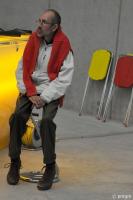Keith Goddard: the cultural promoter
As a promoter and player of Zimbabwean indigenous music, Keith Goddard was strongly influenced in his musical thinking by African music theory and practice, especially its rhythms and textures and the role that music plays in society. He worked with distinguished ethnomusicologists Paul Berliner, renowned for his book The Soul of Mbira, and Andrew Tracey, whose father, Hugh Tracey, founded the International Library of African Music ILAM in Grahamstown, South Africa. He travelled the world with Zimbabwean musicians and his foundation KUNZWANA Trust hosted the Houses of Stone festival with researchers and musicians from various parts of Africa.
Since 1993 a fruitful collaboration with Austria-Zimbabwe Friendship Association has emerged, involving a number of artists and musicians from North and South, ranging from the duo Attwenger to Oliver Mtukudzi, from Wiener Tschuschenkapelle to Chiwoniso Maraire and many others. Over the years there was a strong focal point on the Mbira music as represented by the late Simon Mashoko Gwenyambira. From 1995 onwards very special attention has been arising on the Ngoma buntibe music of the Tonga people who live along the Zambezi River.
Ngoma buntibe has much to do with acoustic space and its sound would not seem out of place in any contemporary New musicsetting. It is this quality that led Keith to introduce Ngoma buntibeto Austrian composers Peter Androsch, Klaus Hollinetz, Lukas Ligeti and Werner Puntigam which resulted in the electro-acoustic composition project, Six Reflections on Tonga Music in 1997. In the same year a thirty-strong Ngoma buntibe group, Simonga, took part at the Festival der Regionen in Upper Austria. And a combined Ngoma buntibe ensemble Simonga-Maliko from both sides of the Zambezi River was invited to attend the Parade as part of the European Cultural Capital Linz09. This cultural exchange programme has from 2001 onwards broadened into an ICT4D project TONGA.ONLINE in the Binga area (www.mulonga.net) providing some schools and the community in the remotest rural areas with access to modern tools of information and communication.

